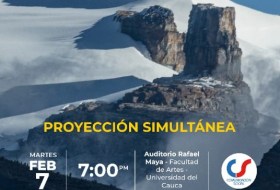News
Páramos The country of mists. A great excuse to narrate the country culturally, socially, politically and environmentally
Social Interaction - Wednesday, February 8, 2023
Páramos The country of mists. A great excuse to narrate the country culturally, socially, politically and environmentally
Carlos Rincón, Co-director of the documentary that won the Biodiversity Award at SUNCINE 2022, spoke about this audiovisual proposal that was presented simultaneously in nearly 70 different places and is proposed as an option to make visible the problems of the Andean ecosystem.
Páramos El país de las nieblas is a 70-minute feature film co-produced by Anima Fauna and Señal Colombia, where three main conflicts are addressed; delimitation, mining and relationship of local communities (indigenous and peasants). The audiovisual that won the Biodiversity Award during the SUNCINE International Environmental Film Festival in Barcelona, is directed by Alejandro Calderón and Carlos Rincón.
The documentary was presented on February 7 simultaneously in different places, one of these spaces was the Rafael Maya auditorium of the Faculty of Arts at the University of Cauca. “For me the páramo is an intimate experience with the birth of water. It is that ecosystem where you breathe the water, where you walk on clouds when you are there, live with the frailejones, see the fauna and feel the mist. The mist is a constant presence and hence one of the reasons for the name. One knows that there is a cycle of water that comes and goes and rivers arise. When you realize that the most important rivers in Colombia are born in the páramos, you realize that it is a territory of water,” said Carlos Rincón, co-director of the documentary.
With a team made up of Alejandro Calderón, directing the documentary, Laura Gómez, who is the producer, and Natalia Cano, who leads the investigation. “We were fortunate that Señal Colombia believed us and copied our idea because when we wanted to do this job, the hard part was explaining to people what we wanted to do with the platform and with the documentary. To the extent that people couldn't see it, they had to trust blindly. Finally, we won a call with the channel, he loved the idea and was one of our first allies”, added Carlos Rincón.
“There are many realities. There is a reality, for me that is one of confusion and ignorance. There is another reality and that is that there are very large economic interests where money is more important than anything else. In addition, the clash of cultural and traditional interests with today's reality. (...) We are very concerned that it is not clear where we are going, especially Colombia is a specialist in this and, surely, we are not the only country like this, where everything is eternal to make decisions, it is impossible to say that people he is not interested in respecting and finding out about the laws. So we ask people to conserve, but we're not giving them information about why they should conserve. And that is one of the reasons why we make the platform and the documentary, it is a new way for people to begin to understand what a páramo is and why it is important to conserve it”.
The audiovisual producer spoke about the importance of starting to create communication strategies from research to tell people, because the greatest value that a people has is their knowledge and it must be shared. “We have many problems around the issue of the páramos. It is not just the páramo as land, but all this social, cultural, educational and political context that exists in the country. Obviously we focus on the mining issue in this case because this is going to be a series. There the conflict is that the rules are not made for everyone because there are small miners who have been working for many years and do not give them the facilities to become official. The large multinational companies have all the facilities: from money to the capacity and political influence to do so”, he concluded.
Social Communication Program
Email: csocial@unicauca.edu.co


